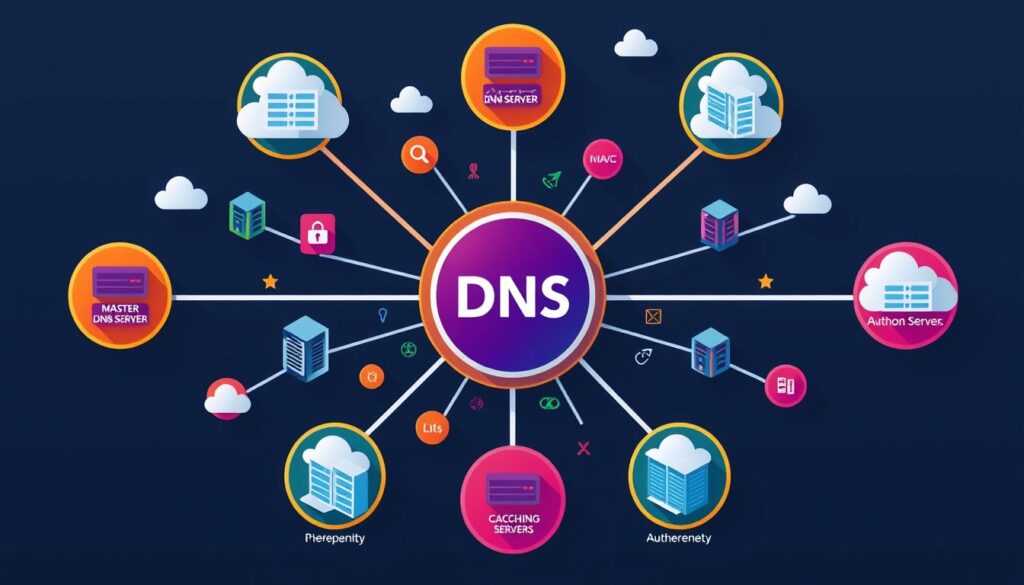DNS Domain name server. Have you ever wondered how entering a domain name like “example.com” causes your browser to connect to a website? The Domain Name Server, or DNS, is the solution. It is essential for converting domain names into computer-understandable numbers. We can utilize the internet more easily as a result.
Since DNS is the primary component of how we connect to the internet, it is crucial to understand it. We’ll examine DNS’s definition, operation, and current significance in this post. We will examine data from IETF and ICANN.
Important Takeaways
- DNS translates domain names into IP addresses, enabling web access.
- Understanding DNS is essential for navigating the internet effectively.
- Reliable DNS services enhance browsing speed and website accessibility.
- ICANN and IETF provide extensive information about DNS operations.
- Knowledge of DNS can aid in troubleshooting connectivity issues.
What Is DNS Domain Name Server
The internet’s domain name system, or DNS, is essential. It links IP addresses to easily remembered website addresses. Understanding DNS helps us see how it works as a directory for online navigation. Let’s explore the basics of DNS and why it’s vital for smooth web interactions.
Understanding the Basics of DNS
DNS plays a vital role in the internet. It acts as a bridge between easy-to-use URLs and the computer’s language, IP addresses. When you type a website’s address, DNS finds the right IP address for you. This makes accessing websites easy.
The DNS system is structured like a hierarchy. Many servers work together to quickly answer your requests.
How DNS Works in Simple Terms
Think of DNS like a phone book. Instead of remembering numbers, you use names. When you visit a website, DNS changes the website’s name into an IP address. This directs you to the site you want.
This process involves several steps. It starts with a DNS server query and ends with caching for faster future requests. This makes browsing the web quicker and more efficient.
| Component | Description |
|---|---|
| Domain Name | The user-friendly address to locate a website, such as www.example.com. |
| IP Address | A numerical label assigned to each device connected to a network, necessary for communication. |
| DNS Resolver | Responsible for receiving the DNS query and initiating the process to convert the domain name into an IP address. |
| Authoritative DNS Server | Provides responses to requests regarding domains under its management, returning the corresponding IP addresses. |
| Recursive DNS Query | A query where the DNS resolver will perform the necessary steps to find the final IP address. |
The Role of DNS in Internet Connectivity
DNS Domain name server. Understanding DNS is key for smooth internet use. It turns domain names into IP addresses. This lets us easily access websites.
Translating Domain Names into IP Addresses
A dns explanation shows how domain names become IP addresses. When you type a website, a dns lookup happens. This lets the network find the server with the content.
This step is vital for getting data online. It makes it easy to visit different websites.
Importance of Reliable DNS Services
Good dns services are crucial for fast internet. They help websites load quickly and stay up. Bad DNS can cause slow sites or no access.
This can really upset users and hurt businesses. A top-notch dns service keeps things running smoothly. It makes online browsing better for everyone.
DNS Server Types Explained
Knowing about dns server types is key to using the internet well. Each type of DNS server has its own role in the DNS system. We’ll look at three main types and what they do.
Recursive DNS Servers
Recursive DNS servers help turn domain names into IP addresses. When you enter a website’s address, they ask other DNS servers for the IP. They keep asking until they find the right one.
These servers make it easier for users by handling the hard work behind the scenes.
Authoritative DNS Servers
Authoritative DNS servers have the real DNS records for domains. They give the final answers to domain name questions. When they get a request, they share the IP address from their database.
This server is vital for keeping the domain name system accurate and reliable.
Caching DNS Servers
Caching DNS servers save DNS query results to speed things up. When a domain name is looked up, the IP is stored in the server’s cache. This way, future requests for the same domain are fast without needing to ask the authoritative server again.
This caching helps make the internet faster and cuts down on network traffic.

DNS Records: What You Need to Know
Understanding dns records is key for anyone dealing with online stuff and website management. Different DNS records have different jobs. They help websites and email systems work smoothly. We’ll look at A, AAAA, CNAME, and MX records and why they matter for websites and emails.
Types of DNS Records
Each dns record type has its own role. Here’s a quick rundown:
- A Records: Maps domain names to IPv4 addresses. This makes sure users get to the right server when they enter a web address.
- AAAA Records: Like A records but for IPv6 addresses. They’re needed as the internet grows.
- CNAME Records: Lets one domain name be an alias of another. This makes managing multiple subdomains easier.
- MX Records: Shows which mail servers get emails, answering what is domain name in email. When sending emails to the appropriate recipient, it is essential.
Knowledge of CNAME, MX, AAAA, and A Records
Let’s break down these records with a table:
| Record Type | Description | Use Case |
|---|---|---|
| A Record | Links a domain to an IPv4 address | Website hosting |
| AAAA Record | Links a domain to an IPv6 address | Future-proofing for the internet |
| CNAME Record | Alias for another domain | Managing multiple domains |
| MX Record | Indicates the mail servers for a domain | Receiving emails |
Each dns record is important for website and email reliability. They’re crucial for both personal and business needs.

How to Configure Your DNS Settings
Managing your DNS settings is key for a good internet experience. Proper dns configuration keeps your site up and running smoothly. Here’s a simple guide to set up your DNS and fix any problems.
Step-by-Step Guide to DNS Configuration
Setting up your DNS might differ based on your hosting. But the basic steps are the same. Follow these steps for typical dns configuration:
- Access the dashboard of your domain registrar by logging in.
- Locate the DNS management section.
- Edit the DNS records as needed:
- For A records, input the required IP address.
- For CNAME records, specify the corresponding domain.
- For MX records, enter the mail server information.
Save changes and allow time for propagation. Perform a dns query to confirm that your records are updated correctly.
Troubleshooting DNS Issues
At times, you might face dns problems that stop your site from working right. Here are common issues and fixes:
- Domain Not Resolving: Make sure the A record points to the right IP.
- Incorrect CNAME Entry: Double-check for any typos in the CNAME record.
- DNS Propagation Delay: Await the modifications to take effect for up to 48 hours.
- Testing DNS Setup: Use online tools to perform a dns query and ensure records are correctly set.
The Importance of DNS Lookups
Understanding dns lookups is key for anyone online. A dns query turns domain names into IP addresses. This lets users easily access web content.
Exploring these lookups shows their vital role in our digital lives.
What Happens During a DNS Lookup?
A dns lookup involves several steps. First, a user’s device sends a dns query to a recursive DNS server. If the server doesn’t have the info, it asks other DNS servers.
This keeps going until the info is found or the query fails. So, users can access content quickly.
Understanding DNS Queries in Detail
There are two main types of dns queries: forward and reverse. Forward queries change domain names to IP addresses, which is needed to visit websites. Reverse queries do the opposite, showing the domain name from an IP address.
| Type of DNS Query | Objective | For instance |
|---|---|---|
| Forward DNS Request | converts IP addresses from domain names. | www.example.com → 192.0.2.1 |
| DNS reverse query | IP addresses are converted to domain names. | 192.0.2.1 → www.example.com |
Final Thought
DNS Domain name server. We have examined the definition of DNS and its significance in this post. It seamlessly connects us to websites. DNS converts memorable domain names into computer-understandable IP addresses.
The secret to dependable and quick browsing is DNS. Knowing about DNS helps us manage our online space better. It’s crucial for keeping our internet experience smooth.
Understanding DNS helps us improve our online experience. It’s vital in today’s digital world. A strong DNS presence is essential for a reliable online life.
FAQ
What is a DNS server?
A DNS server is a special server that holds DNS records. It turns domain names into IP addresses. The DNS server determines the IP address for you when you type a URL.
What kinds of DNS records are there?
DNS records come in various varieties. A records and AAAA records are for different types of IP addresses. CNAME records and MX records help with website aliases and email delivery. Knowing about these records is key for managing websites and emails.
Why is understanding DNS important for internet connectivity?
DNS is crucial for the internet because it lets us access websites easily. Without it, websites might not load or could be slow. So, having a reliable DNS service is important for a good online experience.
How should my DNS settings be set up?
Go to the management panel of your hosting company or domain registrar to configure your DNS. You can manage records like A, CNAME, and MX. A guide can help, and fixing problems might involve checking your records or network settings.
What precisely takes place when a DNS lookup occurs?
A DNS query is sent to a DNS server when you type in a URL. After looking through its cache, the server asks other servers if it is unable to locate the IP address. This makes sure websites load quickly and smoothly.
What is the function of an email address’s domain name?
An email address’s domain name instructs the mail server where to deliver emails. The DNS’s MX records aid in locating the appropriate mail server. This is important for sending and receiving emails.
What are DNS queries and why are they significant?
DNS queries are requests to find a domain’s IP address. They’re important because they help us navigate the internet. Knowing about DNS queries helps solve internet problems and improves our online experience.






